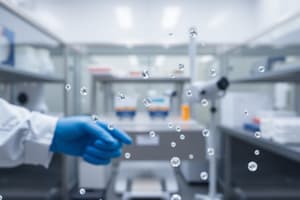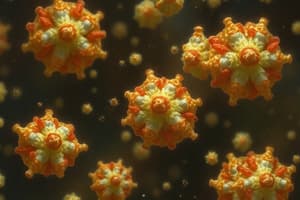Podcast
Questions and Answers
ما هو الجانب الأكثر أهمية للحفاظ على سلامة وجودة الأدوية؟
ما هو الجانب الأكثر أهمية للحفاظ على سلامة وجودة الأدوية؟
- تعقيم المواد الخام (correct)
- التحقق من جودة المنتج النهائي
- اختيار المواد الخام
- التوزيع النهائي للمنتج
ما هي أحد النتائج المحتملة للتلوث الميكروبي للأدوية؟
ما هي أحد النتائج المحتملة للتلوث الميكروبي للأدوية؟
- خفض نشاط الدواء (correct)
- تحسين فعالية العلاج
- زيادة جودة المنتج
- زيادة مخاطر السلامة
متى يمكن أن يحدث التلوث الميكروبي للمستحضرات الصيدلانية؟
متى يمكن أن يحدث التلوث الميكروبي للمستحضرات الصيدلانية؟
- في مرحلة توزيع المنتج
- في مراحل متعددة من عملية التصنيع (correct)
- في مرحلة اختيار المواد الخام فقط
- في مرحلة تحقق جودة المنتج النهائي فقط
ماذا تؤدي التعقيم بطرق جيدة إلى تحقيقه في مجال الصيدلة؟
ماذا تؤدي التعقيم بطرق جيدة إلى تحقيقه في مجال الصيدلة؟
ما هو أحد العوامل التي يعتمد عليها فعالية طرق التطهير؟
ما هو أحد العوامل التي يعتمد عليها فعالية طرق التطهير؟
ما هي الأمور الثلاث التي يجب تنفيذها لضمان سلامة وجودة المنتجات الصيدلانية؟
ما هي الأمور الثلاث التي يجب تنفيذها لضمان سلامة وجودة المنتجات الصيدلانية؟
ما هي أحد أهميات مراقبة فعالية إجراءات التطهير؟
ما هي أحد أهميات مراقبة فعالية إجراءات التطهير؟
ما هو الجزء الأكثر أهمية لضمان سلامة وجودة المنتجات الصيدلانية؟
ما هو الجزء الأكثر أهمية لضمان سلامة وجودة المنتجات الصيدلانية؟
ما هي الكائنات الحية الدقيقة المرتبطة بالتلوث الميكروبي والتي تشكل خطرًا على سلامة المرضى؟
ما هي الكائنات الحية الدقيقة المرتبطة بالتلوث الميكروبي والتي تشكل خطرًا على سلامة المرضى؟
ما هو أحد مصادر التلوث الذي يمكن أن يكون نتيجة له العديد من الكائنات الحية الدقيقة المرتبطة بالتلوث؟
ما هو أحد مصادر التلوث الذي يمكن أن يكون نتيجة له العديد من الكائنات الحية الدقيقة المرتبطة بالتلوث؟
ما هو الهدف الأساسي لتقليل التلوث الميكروبي في عملية التصنيع؟
ما هو الهدف الأساسي لتقليل التلوث الميكروبي في عملية التصنيع؟
ما هي أحد أساليب التعقيم المستخدمة في تصنيع المستحضرات الصيدلانية؟
ما هي أحد أساليب التعقيم المستخدمة في تصنيع المستحضرات الصيدلانية؟
ما هو دور التعقيم في عملية تصنيع المستحضرات الصيدلانية؟
ما هو دور التعقيم في عملية تصنيع المستحضرات الصيدلانية؟
ما هو التصنيف الذي يُعتبر منظفات الأسطح والأجهزة ذات مستوى منخفض من التطهير؟
ما هو التصنيف الذي يُعتبر منظفات الأسطح والأجهزة ذات مستوى منخفض من التطهير؟
ما هو التصنيف الذي يُعتبر منظفات ذات مستوى عالٍ من التطهير؟
ما هو التصنيف الذي يُعتبر منظفات ذات مستوى عالٍ من التطهير؟
- ما هو دور التطهير في علم الأحياء الدقيقة الصيدلانية؟
- ما هو دور التطهير في علم الأحياء الدقيقة الصيدلانية؟
Study Notes
Pharmaceutical Microbiology: Microbial Contamination and Sterilization Methods
Pharmaceutical microbiology is a crucial aspect of ensuring the safety and quality of medications, as microbial contamination can lead to health hazards, altered therapeutic activity, or decreased product quality. This article will discuss the subtopics of microbial contamination and sterilization methods in pharmaceutical microbiology.
Microbial Contamination
Microbial contamination of pharmaceutical preparations can occur at various stages of the manufacturing process, from raw material selection to the final product. Some of the microorganisms associated with microbial contamination and of concern to patient safety include:
- Bacteria
- Fungi
- Viruses
- Biofilms
Contamination can be caused by diverse sources, such as:
- Raw materials and ingredients
- Manufacturing processes
- Equipment and utensils
- Personnel
- Environment
To minimize microbial contamination, it is essential to implement effective control strategies in the design of manufacturing processes, microbial risk assessment of raw materials and ingredients, and routine monitoring and testing of the final product.
Sterilization Methods
Sterilization is a crucial step in pharmaceutical manufacturing to ensure that the final product is free from microbial contamination. Various sterilization methods are available, including:
- Autoclaving
- Sterilization by radiation
- Chemical sterilization
- Plasma sterilization
- Steam sterilization
Each of these methods has its advantages and disadvantages, and the choice of method depends on factors such as the product's composition, packaging, and desired sterility level. It is essential to validate the chosen sterilization method to ensure its effectiveness in eliminating microbial contamination.
Disinfection and Disinfectants
Disinfection is another crucial aspect of pharmaceutical microbiology, as it helps reduce microbial counts on surfaces and equipment, preventing cross-contamination. Disinfectants can be classified into low-level disinfectants (LLDs) and high-level disinfectants (HLDs), with the former removing the vegetative form of bacteria, few fungi, and some enveloped viruses, while the latter inactivating a broader range of microorganisms.
Some common disinfectants include:
- Alcohols
- Phenolics
- Chlorine-based disinfectants
- Hydrogen peroxide
- Sodium hypochlorite
The efficacy of disinfection methods depends on factors such as the type of disinfectant, its concentration, contact time, and the surface to be disinfected. It is essential to monitor and test the effectiveness of disinfection procedures to ensure their efficacy in reducing microbial contamination.
In conclusion, pharmaceutical microbiology is a vital field that focuses on preventing microbial contamination in medications. By implementing effective control strategies, validated sterilization methods, and disinfection procedures, the safety and quality of pharmaceutical products can be ensured.
Studying That Suits You
Use AI to generate personalized quizzes and flashcards to suit your learning preferences.
Description
Explore the crucial aspects of microbial contamination and sterilization methods in pharmaceutical microbiology. Learn about the sources and microorganisms associated with contamination, the various sterilization methods, and the classification and efficacy of disinfectants.




